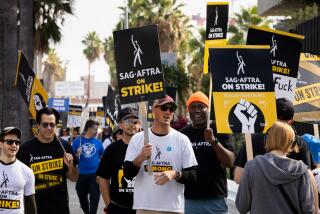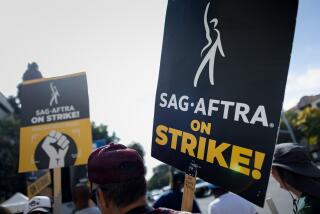Players Back Off Selecting Strike Date
- Share via
CHICAGO — The Major League Baseball Players Assn. signaled its hope Monday of reaching a labor agreement by postponing a decision on setting a strike deadline.
Negotiations have been more civil and sincere than those in previous collective bargaining, and players feared establishing a deadline could have angered owners and derailed the process.
Union head Don Fehr made the surprising announcement after a 3-hour 45-minute, closed-door meeting of the executive council at an airport hotel, saying players were encouraged enough about the tone of recent discussions to “hopefully, over the next several days, find a way to address the remaining issues” between them and owners.
Revenue sharing and the contentious issue of a payroll tax remain the two biggest hurdles to completing a deal that would avert baseball’s ninth work stoppage since 1972, but players indicated their willingness to at least continue talking this week.
The executive council has scheduled a Friday conference call to reevaluate the status of negotiations, resuming today in New York, and whether a strike date would be necessary. Fehr declined to discuss specifics of the meeting at which every club except the Dodgers, who had scheduling conflicts, was represented, but two union sources said potential strike dates of Aug. 30, Sept. 2 and Sept. 16 were discussed.
A date was not selected, the sources said, but there is growing support for Sept. 2 or Sept. 16 if negotiations continue to lag on the core economic issues. Owners are aware of the dates the union is leaning toward if a deal is not completed soon.
The sides are $150 million apart on revenue sharing in an industry that last year generated a record $3.55 billion in revenue, with owners at $400 million and the union at $250 million. The union also wants the payroll tax component to be eliminated, putting everything under one umbrella of transferring money from high-revenue to low-revenue clubs.
Owners have said they would not initiate a work stoppage this season, vowing not to lock out players through the World Series, but they could unilaterally implement new work rules after the postseason is completed, prompting the union to retain its primary bargaining chip of a potential strike despite its optimism about talks.
Ultimately, there may not be enough time to complete an agreement before Friday’s conference call because of management’s demand to slow escalating player salaries by taxing teams with high payrolls, and the union’s strong opposition to that proposal, but the buzzer hasn’t sounded yet.
“I don’t think anyone would argue that setting a strike date would throw a wrench into the whole process,” said Atlanta Brave pitcher Tom Glavine, who sources said was the most vocal player in the meeting. “We all understand what happens if a day is set, and the rhetoric that starts with that. The players have said, over and over again, that we are serious about trying to get a deal done.
“We feel like there’s a window of opportunity to hopefully get something done in the next few days. We’re willing to explore that without going down the road of having to throw a strike date into it, and what that may do to either hurt the process or end the process altogether. It hurts nobody by giving it a couple of extra days.”
Although pleased the union did not turn up the heat by scheduling a walkout or making the potential strike dates public, owners said the onus is still on both sides to avert a strike.
“We don’t feel at all defensive,” Rob Manfred, baseball’s lead labor lawyer, said in a conference call. “First of all, you need to evaluate what they did today against the backdrop that we pledged months ago not to interrupt the season at all.
“Both parties feel pressure to reach an agreement because of the enormous harm that would [be] caused by a strike. Both parties have shown flexibility in an attempt to get to a common ground, with respect to those core economic issues, and the next few days will be full, busy days for us.”
The union last set a strike date July 28, 1994, triggering a work stoppage that lasted 232 days and wiped out the playoffs and World Series, returning to work only after a federal judge found owners guilty of illegal labor practices.
Negotiations this season have progressed steadily since resuming in earnest after the All-Star break. Agreements have been reached on such minor issues as increasing the minimum salary to $300,000, starting next year, and the sides are moving closer to completing a plan for steroid testing after the union made a major policy shift in ending its long-standing opposition to mandatory drug testing.
“I see a difference based on the content of the negotiations this time around, as opposed to ‘94,” said Glavine, a senior member of the union’s board. “In ‘94, there was virtually no chance we would reach an agreement without a work stoppage. They were talking about a salary cap, and we weren’t. In this negotiation, we have been talking about virtually the same thing.
“It boils down to luxury tax, revenue sharing and some other things that I think we’ve all been willing to talk about. It’s just sometimes a difference in philosophy, and how you’re going to reach certain goals, and that is a far easier bridge to gap than the one we had in ’94.”
More to Read
Go beyond the scoreboard
Get the latest on L.A.'s teams in the daily Sports Report newsletter.
You may occasionally receive promotional content from the Los Angeles Times.










